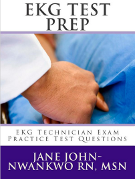There is no legislation that specifically outlines the EKG technician training and certification requirements in New Jersey. In general, most states categorize technicians as the unlicensed assistive personnel (UAP) who are required to work under the direct supervision of the nurse or physician. A technician is generally allowed to perform tasks that the licensed provider decides are suitable for delegation to the UAP. In addition, establishments may have adopted their own expectations for the training and certification of technicians.
Delegation Regulations
The New Jersey Board of Nursing has definitive guidelines that must be followed when a nursing task is delegated to an unlicensed member of the patient care team. The purpose of delegation regulations is not to make life difficult for those who are ancillary providers, but to ensure the health and safety of patients through competent and compassionate care. When a nurse decides to delegate tasks such as electrocardiogram administration, procedure preparation, telemetry, or Holter monitoring they must follow the steps outlined by the decision making model adopted by the board…
- consistent with the nurse’s scope of practice
- authorized by a valid order
- supported by research data from nursing literature
- does the delegatee have the required knowledge and skill
- within the accepted “standards of care”
- willing to assume accountability for the provision of care
Subchapter 6 13:37-6.1 addresses the delegation of selected nursing tasks. It is important for medical personnel to understand that the nurse assumes full responsibility for the delegation of tasks and the health outcomes that result from such delegation. New Jersey law states that the registered professional nurse is responsible for the nature and quality of all nursing care including the assessment of the nursing needs, the plan of nursing care, implementation, monitoring, and evaluation of the plan. The nurse may not delegate the performance of a nursing task to a person who has not been adequately prepared by verifiable education and training. Tasks that require professional nursing knowledge, judgment, or skill may never be delegated to ancillary providers. Prior to delegation, the nurse is required to assess…
- the condition of the patient
- the education, skill, and training of the delegatee
- the nature of the task
- the provision of supervision
Education and Training Requirements
An EKG technician is not required to have extensive college education or highly specialized training in order to enter the profession. Increased federal and state standards for competency assessment in healthcare has led employers to establish more stringent standards for the unlicensed personnel that they hire. While it may be possible to become a technician without prior training and experience in direct patient care, those who are new to the medical field may find it difficult to compete with applicants who have some practical understanding of the unique demands that patient care creates. For this reason, employers often advise individuals to spend a few years working in a more generalized area of practice before transitioning to the cardiac care unit.
Two of the most popular entry-level patient care positions include the medical assistant and nursing aide. The ability to gain exposure to a broad range of procedures and specialties is very important for helping new technicians evaluate the career path that is most suitable for them. These options allow individuals to acquire the basic knowledge and skills that are needed to become successful in any medical specialty. Those who elect to pursue this route are often encouraged to begin networking with EKG technicians early in their career.
State Contact Information
New Jersey Department of Health
Phone: (866) 561-5914
Fax: (609) 633-9060
Email: Contact Form
 PO Box 367, 120 S. Stockton St. Trenton, NJ 08625
PO Box 367, 120 S. Stockton St. Trenton, NJ 08625
Phone: (973) 504-6430
Alternate: (973) 504-6200
Email: Contact Form
PO Box 45010 Newark, NJ 07101






Good afternoon,
My name is Anabel, and I work for E & S Academy. Currently, we run an EKG program. I wanted to know, if possible, what are the up-to-date requirements for a student to have in order to take an EKG class.